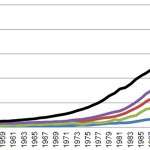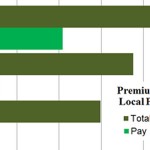Things We Read Today (35), Tuesday
The Thing About Free Healthcare
To those who might dismiss Dr. Peter Weiss as an uncharitable curmudgeon and therefore an outlier, I can only say, “We’ll see.” And see we will.
Dr. Weiss has notified his patients precisely what the “free” “annual” “preventive” exam marketed under ObamaCare will cover. According to Weiss, though, it’s even worse than simply having to turn on the meter, so to speak, after the free services are offered:
… we are obligated by law to code specifically for the reason of the visit. An annual exam is one specific code; you can not mix this with another code, say, for rectal bleeding. This annual visit covers the exam and “discussion about the status of previously diagnosed stable conditions.” That’s the exact wording under that code — insurance will not cover any new ailment under that code.
If you are here for that annual exam, you will not be covered if you want to discuss any new ailment or unstable condition. I cannot bait and switch to another code — that’s illegal. We, the physicians, are audited all the time and can lose our license for insurance fraud.
You, the patient, will then have to make a decision.
Do you want your “free” yearly exam, or do you want to pay for a visit which is coded for a particular, new problem? You can have my “free” exam if you only discuss what Obamacare wants me to discuss.
ObamaCare also requires him to discuss some issues, like seat-belt usage, writes Weiss. (No doubt the mandatory-inquiry list will expand, perhaps adding mandatory follow-up visits.) Remember when you used to be able to go in, get a check up, bring up new problems, and have a free-ranging discussion with your doctor about your health? Well, hey, what do you want for “free”?
Making Your Living Off the Fatally Ill
Yesterday, I mentioned Glenn Reynolds’s op-ed likening Washington, D.C., to the oppressive Capitol of The Hunger Games. Today, he’s posted a letter from conservative D.C. lobbyist Stewart Hall expressing sentiments with which I have some sympathy:
Ironically, I have spent the better part of my time here working to dismantle the federal leviathan that pays the freight for my family to live in Western Fairfax County in one of the highest earning zip codes in the nation. I would gladly make the trade if I could for the sake of my daughters’ futures. I told my wife the morning after the election that if the people wanted big government then let them have it as we are burrowed down in the one locale where I can continue to get paid to fight the legal and regulatory nonsense that is visited upon my clients every week. Perhaps that is a petulant attitude, but most of the folks who voted for Obama have no idea what they just did to themselves. It won’t be the rich guy who takes it in the shorts in the next four years, but the working and non working lower classes as their wages and or benefits are eroded through inflation, Obamacare hourly cut backs, and economic stagnation.
Of course, I agree with Hall’s politics, but I can also relate to the peculiar feeling of internal-conflict-laden security that comes with making one’s living trying to fix problems in an area that insists on creating many more of them.
In that regard, it is with some amusement that I note that Rhode Island did not make William Baldwin’s eleven-count list in “Do You Live in a Death Spiral State?”
Thinking about buying a house? Or a municipal bond? Be careful where you put your capital. Don’t put it in a state at high risk of a fiscal tailspin.
Eleven states make our list of danger spots for investors. They can look forward to a rising tax burden, deteriorating state finances and an exodus of employers. The list includes California, New York, Illinois and Ohio, along with some smaller states like New Mexico and Hawaii.
Finance-industry-friendly policies like pension reform may have played a role in keeping RI off the undesirable roll call, by maintaining the state’s creditworthiness. However, the other criterion is the ratio of “makers” to “takers” — that is, people who are “gainfully employed in the private sector” and people who “draw money from the government.”
I wonder about the metric, though, in Rhode Island’s case. For one thing, it’s by population, so Rhode Island’s relatively poorly paid population is supporting an inordinately large public sector by dollar amount. For another thing, the “takers” list includes pensioners, and Rhode Island is a notoriously inhospitable place in which to live as a retiree.
Loss of Self Control
Writing about Michigan, Michael Austin touches on another topic indicative of Rhode Island’s decline:
As I tried to argue last January, freedom usually disappears in fits and starts, and Republican Rome saw its liberty eroded by the slow, yet steady, expansion of the powers of the Senate-appointed, one-year-term-limited dictator. Similarly, Michigan’s Public Act 4 was the third incarnation of an emergency-manager law, each one giving more power to the manager than the last. Under Public Act 4, the managers could dismiss local elected councils, break and renegotiate contracts, and essentially take over any bureaucracy in their locality. They still remained under the control of the governor, and approved by the state legislature, but their powers were clearly growing. Governor Snyder argues that not having any emergency-manager law dramatically raises the risks of municipal bankruptcies, but some observers may argue that is just what is needed to bring a shock dose of reform to Michigan’s failing local governments.
Michigan’s “emergency managers” are, I’m sure you discerned, comparable to Rhode Island’s “receivers,” whom many (me included) have referred to as “dictators.”
Austin speculates that Illinois may be the first state to advance this particular loss of self-government to the state level, but surely Rhode Island would be in the running.
When the Culture Inverts
Here’s something completely different, but it’s the sort of thing that just screams out to be passed along. According to the Huffington Post UK, a new study has found that female teachers tend to give boys lower grades. At least in part, that’s the secondary result of male students’ expectation of receiving lower grades from their female teachers. Helen Smith suggests:
Books like the The End of Men: And the Rise of Women or Manning Up: How the Rise of Women Has Turned Men into Boys like to smugly point out that men just aren’t the go-getters that women are, especially when it comes to school. What they leave out of the equation is that boys and men are discriminated against–giving them little incentive to try. With little incentive to try, college and the American Dream is often not a reality, or even desired, leaving a multitude of men without work skills, and/or achieving their full potential.
If pointed in the opposite gender direction, some might be inclined to characterize this cycle as evidence of institutional bias. Whatever the case, two thoughts come to mind.
The first is that radical change — as opposed to the gradual change of a non-engineered culture — will tend to empower one group to take advantage of another, rather than to bring them both to equality. Consider the latest example, in New York, of a female teacher taking sexual advantage of her male students, explicitly linking sexual favors as an incentive for academic performance.
The second is that, when that sort of reversal happens, society goes backwards rather than forwards. It’s purely speculative, on my part, but I can’t help but wonder how much contribution to our economic stagnation has been made by the dissolution of the family and the multiple public policies and radical agendas that have pushed men away from the feeling of obligation to strive to have and then to support wives and children.
That’s not to say that we should return to the bad old days or that we should have an economy that’s explicitly founded on men’s familial instincts. But motivation to produce is a significant factor in economic growth, and thinking of my family of five as more important than myself surely drives me to produce more than would my own, lonely subsistence.




